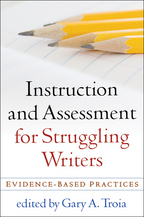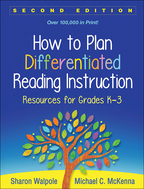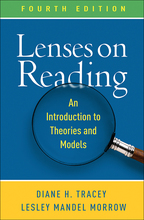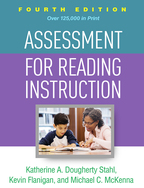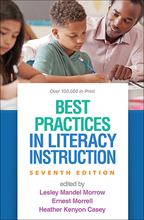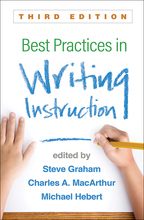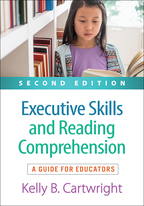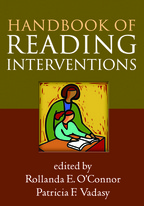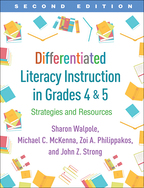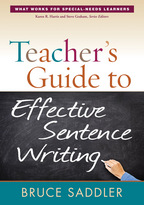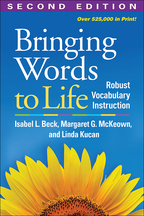Instruction and Assessment for Struggling Writers
Evidence-Based Practices
Edited by Gary A. Troia
HardcoverPaperbacke-bookprint + e-book
Hardcover
orderNovember 11, 2008
ISBN 9781593859923
Price: $83.00 401 Pages
Size: 6" x 9"
Paperback
orderApril 27, 2010
ISBN 9781606239070
Price: $55.00401 Pages
Size: 6" x 9"
“A valuable text....The greatest strength of this book is its research base. Extensive reviews of the research in the areas that are addressed are presented along with lengthy lists of references at the end of each chapter.”

—NASP Communiqué
“Provides a very welcome addition to what is a rather sparse landscape of quality publications on what has often been described as the 'most neglected of the three R's'....Brings together the collected wisdom of an admirable array of writers and researchers from the USA to address various aspects of writing instruction and assessment. Troia's own credentials make him uniquely qualified to edit this valuable reference.”

—REACH Journal of Special Needs Education in Ireland
“This is the first book to focus on writing instruction and assessment for students with learning challenges. It is a timely and valuable resource for teachers and researchers. I look forward to using this book as a text in my undergraduate courses and graduate seminars in literacy instruction for students with special needs.”

—Linda H. Mason, PhD, Department of Educational and School Psychology and Special Education, Pennsylvania State University
“An especially practical resource, the book combines accessible summaries of research evidence on a variety of topics in writing with how-to ideas that can be implemented right away by a motivated clinician or teacher. Without giving short shrift to research, the contributors devote ample attention to the instructional needs of struggling writers and those who work with them.”

—Kenn Apel, PhD, CCC-SLP, Department of Communication Disorders, Florida State University
“This unique book combines advice on writing instruction and assessment for students with varying learning profiles—those with learning disabilities and language impairments as well as multilingual learners. Chapters present new theories and conceptual frameworks, and recent research. This is an appropriate text for advanced education courses. College and university instructors will have a wide array of chapters to choose from for their teaching.”

—Susan De La Paz, PhD, Department of Special Education, University of Maryland
—NASP Communiqué
“Provides a very welcome addition to what is a rather sparse landscape of quality publications on what has often been described as the 'most neglected of the three R's'....Brings together the collected wisdom of an admirable array of writers and researchers from the USA to address various aspects of writing instruction and assessment. Troia's own credentials make him uniquely qualified to edit this valuable reference.”
—REACH Journal of Special Needs Education in Ireland
“This is the first book to focus on writing instruction and assessment for students with learning challenges. It is a timely and valuable resource for teachers and researchers. I look forward to using this book as a text in my undergraduate courses and graduate seminars in literacy instruction for students with special needs.”
—Linda H. Mason, PhD, Department of Educational and School Psychology and Special Education, Pennsylvania State University
“An especially practical resource, the book combines accessible summaries of research evidence on a variety of topics in writing with how-to ideas that can be implemented right away by a motivated clinician or teacher. Without giving short shrift to research, the contributors devote ample attention to the instructional needs of struggling writers and those who work with them.”
—Kenn Apel, PhD, CCC-SLP, Department of Communication Disorders, Florida State University
“This unique book combines advice on writing instruction and assessment for students with varying learning profiles—those with learning disabilities and language impairments as well as multilingual learners. Chapters present new theories and conceptual frameworks, and recent research. This is an appropriate text for advanced education courses. College and university instructors will have a wide array of chapters to choose from for their teaching.”
—Susan De La Paz, PhD, Department of Special Education, University of Maryland

